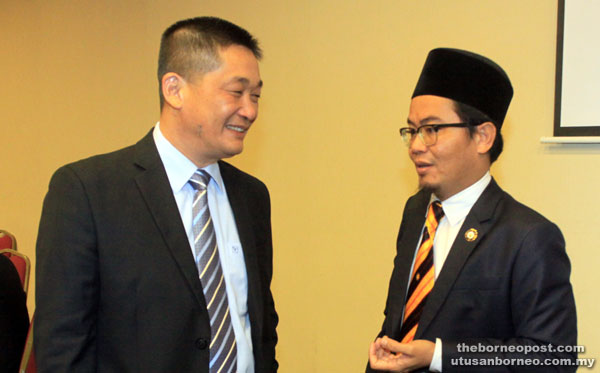See calls for more federal funding as about 95 pct of devt funds come from state’s coffers

See (left) meets Dr Juanda Jaya (BN-Jemoreng) in the media centre after debating the State Budget 2017.
KUCHING: The federal government will contribute only RM282 million to the state’s projected total development expenditure of RM5.928 billion next year.
This was pointed out by Batu Lintang assemblyman See Chee How when debating the State Budget 2017 yesterday.
“In percentage terms, the contribution from the federal government is a mere 4.75 per cent. This means that only RM4.75 will be given to Sarawak for every RM100 of our need for development,” he said.
Contributions to the state’s development fund in previous years were also very small.
Hence, See called on the state government to continue reminding the federal government of its obligation to grant Sarawak equitable financial allocation to catch up with Peninsular Malaysia in developing public facilities and infrastructure.
He said out of the state’s RM5.971 billion development fund this year, the federal government only chipped in RM231 million, and the state had to foot 96 per cent of the development expenditure amounting to RM5.74 billion.”
In the budget for 2015, Sarawak’s total development expenditure amounted to RM4.546 billion, but only RM508 million were sourced from federal funds.
This led See to call on the state government to transform and develop strategic financial measures to amplify and multiply Sarawak’s revenue through prudent management of its resources.
“We could and should have better managed our forest resources, emulating Peninsular Malaysia and Sabah, to zealously develop value-added downstream industries and ensure that our timber and timber products are able to be traded in the ‘high
value markets’, hence generating more revenue while better conserve and sustain our forest resources.
“Foremost in our mind, critical in our pursuit to conserve depletable natural resources, is the petroleum justice that we owe it to ourselves, to Sarawak, and to our future generations to strategically conserve and utitlise it in the best interests of Sarawak.”
See said Sarawak, on shore and offshore, had been demarcated into 48 blocks or fields of oil and gas potentials.
Through the years, he said production sharing contracts (PSC) had been awarded over 27 of these fields, and 13 others were presently been promoted this year and the last.
“It is imperative for us to revivify Sarawak’s sovereign rights to this valuable natural resource, to assert our autonomy and authority over the remaining blocks and fields of oil and gas potentials yet to be awarded with PSC.”
He opined that Sarawak had sacrificed too much of its petroleum resources to the federation.
When the Petroleum Development Act was tabled and passed in Parliament in 1974, there were nine oil companies that were prospecting for oil in the country’s territory – three in Peninsular Malaysia and six in East Malaysia, he said.
Amongst them, only Sarawak Shell Berhad was producing oil of about 93,000 barrels per day, he added.
“The production was increased by more than two folds after the Petroleum Development Agreement was signed, and
soon there were more than four folds production, or 400,000 barrels per day, to finance the federation’s development.
“In June 2009, Petronas then president and acting chairman Tan Sri Hassan Merican revealed that Petronas had until that year paid RM471 billion to the federal government and assumed a cumulative gas subsidy of RM97 billion.”
For that particular financial year ended in March 2009, Petronas had paid to the government RM30 billion in dividends, and the national petroleum company had paid RM29.4 billion in taxes, RM6.2 billion in royalties and RM2.2 billion in export duties, he said.
“Thus contributed RM67.8 billion to the federal government that year, as compared to RM56.8 billion in 2008. Dividends alone, Petronas had paid to the federal government RM30 billion, RM30 billion, RM28 billion, RM27 billion, RM29 billion, RM26 billion and RM16 billion, respectively from 2010 to 2016, hence RM671 billion for the 42 years since its incorporation.
“All these were besides the estimated RM500 billion in taxes, royalties and export duties, together with RM200 billion in gas subsidy. Needless to say, Sarawak is the biggest contributor in terms of oil and gas production and petroleum revenue earning for the federation.”
“We respect Islam. But MA63 says Malaysia is a secular state. And in the Agreement, it also stated that there must be consensus so that we can live harmoniously. And Sarawak signed the Agreement based on that,” he stressed.
Hadi’s private member’s bill seeks to increase the power of the Syariah Courts to mete out punishments. The bill proposes to increase jail terms from the present maximum of three years to 30 years; maximum fine of RM5,000 to RM100,000, and maximum six strokes of the cane to 100.
There has been strong opposition to the bill for fear that it would pave the way for the implementation of hudud law in Kelantan.
Last year, the Kelantan State Legislative Assembly passed an amendment to Kelantan’s Syariah Criminal Code 1993 but could not enforce it due to Act 355.
